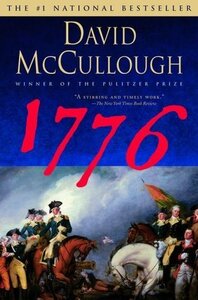You need to sign in or sign up before continuing.
Take a photo of a barcode or cover
McCullough provides great detail about the atrocities and disastrous undertakings encountered by the ill equipped army led by the inept General George Washington. His crossing of the Delaware in the raid on Trenton seems to be his most favorable event.
I was disappointed that the performance of such as Gilbert du Motier, Marquis de Lafayette and Casimir Pulaski were not detailed.
I was disappointed that the performance of such as Gilbert du Motier, Marquis de Lafayette and Casimir Pulaski were not detailed.
3.5 stars, 4 if you "count the pictures."
This book is about 70% text and 30% pictures by volume. The story itself is a very distilled look at the events immediately preceding the "flight" of the British from Boston, through and past Washington's famous "crossing of the Delaware," as the title suggests. There will be no major parts of the history of the war that a history buff would not already know. However, the author does a fantastic job of mixing in correspondence between figures to flesh the story out, and make one feel like one was there. It is not a "battle" book, but rather a look at a roughly 16-month period around the year 1776. What was most interesting (because it was new to me) was the description of how the insurrection/rebellion/war was seen and spoken about in Parliament. There were some great comparisons to draw between "coverage" of the war and the discussion of it in Parliament, to the wars of today.
Overall, very enjoyable. It got a "lower" review because I only wish it had been more detailed, if anything.
This book is about 70% text and 30% pictures by volume. The story itself is a very distilled look at the events immediately preceding the "flight" of the British from Boston, through and past Washington's famous "crossing of the Delaware," as the title suggests. There will be no major parts of the history of the war that a history buff would not already know. However, the author does a fantastic job of mixing in correspondence between figures to flesh the story out, and make one feel like one was there. It is not a "battle" book, but rather a look at a roughly 16-month period around the year 1776. What was most interesting (because it was new to me) was the description of how the insurrection/rebellion/war was seen and spoken about in Parliament. There were some great comparisons to draw between "coverage" of the war and the discussion of it in Parliament, to the wars of today.
Overall, very enjoyable. It got a "lower" review because I only wish it had been more detailed, if anything.
slow-paced
adventurous
informative
tense
medium-paced
Finally finished this one! Intense reading. Great account of 1776. Tied a lot of snippets of history together that I've picked up over the years, especially from living in Boston and enjoying "Evacuation Day". I enjoyed reading the details of Knox's work hauling cannon from Fort Ticonderoga to Framingham, then Dorchester Heights. I saw glimpses of Alexander Hamilton (as a 19 yr old). I may need to re-read this one, there is so much detail to learn in this work.
This book was decent. Obviously well-researched, but extremely narrow in scope. I get that the book is titled, 1776, and therefore one shouldn't expect it to go much beyond that, but even within that year, the focus is entirely on General Washington. This book is not meant for readers who are just starting to learn about the Revolutionary War. The author expects the readers to already be familiar with the events leading up to those covered in this book as well as with events that were concurrent with those not in the book but not covered. For example, this book does not go into what any of the members of Congress were doing at the time, nor any of the philosophies and thought processes that they went through leading up to writing the Declaration. This book also starts in late June of 1775 when Washington took command of the American Forces. Again, the author expects the reader to be familiar with events that occurred before Washington's appointment. Even the Battle of Bunker Hill, which immediately preceded Washington is not covered in this book. I admit, my knowledge of the Revolutionary War and the surrounding time period leading up to America declaring its independence is very rusty, which is why I picked up this book in the first place, but I'm thinking I should've started with, The American Revolution: A History by Gordon Wood. If you, like me, are looking for an introductory/general overview of the Declaration of Independence and the Revolutionary War, I would suggest skipping this book or waiting until after you've become familiar with the surrounding events before reading this one.
A British ship’s surgeon who used the privileges of his profession to visit some of the rebel camps, described roads crowded with carts and wagons hauling mostly provisions, but also, he noted, inordinate quantities of rum — “for without New England rum, a New England army could not be kept together.” The rebels, he calculated, were consuming a bottle a day per man.
One late night foray led me to finish this book hours after beginning. It is no great shame, but it was the musical Hamilton which inclined me to approach the work. My days of matriculation were often obscured to such narrative histories. 25 years ago at university I was an aspiring Marxist and I saw the American Revolution as between two slave owning factions of the same burning house. I now regard that approach as painfully naïve.
1776 chronicles more or less of the famed year in American Independence when Washington's cobbled forces stumbled about. The vastly superior Royal forces didn't appear to appreciate the significance of the stakes. Few do in the moment.
One late night foray led me to finish this book hours after beginning. It is no great shame, but it was the musical Hamilton which inclined me to approach the work. My days of matriculation were often obscured to such narrative histories. 25 years ago at university I was an aspiring Marxist and I saw the American Revolution as between two slave owning factions of the same burning house. I now regard that approach as painfully naïve.
1776 chronicles more or less of the famed year in American Independence when Washington's cobbled forces stumbled about. The vastly superior Royal forces didn't appear to appreciate the significance of the stakes. Few do in the moment.
I've read some books on The American Revolution, but listening to 1776, read by the author, a regular narrator for Ken Burns films, I learned how hopeless the first year of the war seemed against the mighty British empire. Through McCullough's style of presenting original sources without extensive interpretation you hear how the British brought more soldiers to squash the Revolution than there were citizens in any one of America's young cities. Washington learns and adapts, using the Colonies advantages, rather than continuing to fight the same fight her majesty brought. It's incredibly exciting, and if you didn't know how it all turned out, you'd be sure the underdog would never be victorious.
An easy but detailed enough read covering one of the most pivotal and difficult years in American history.

